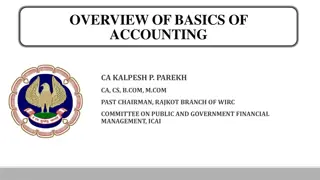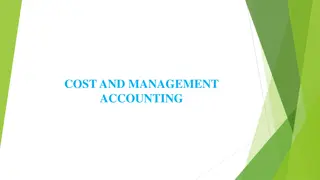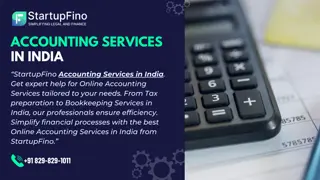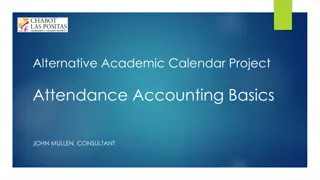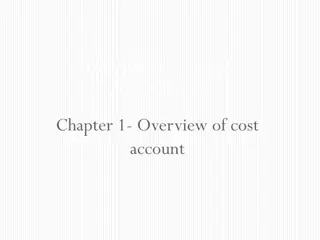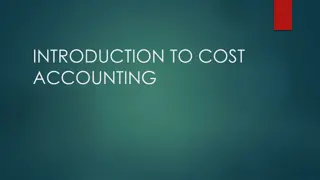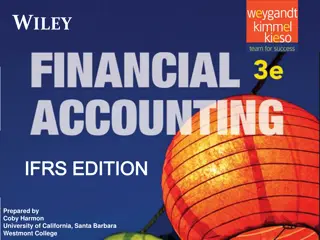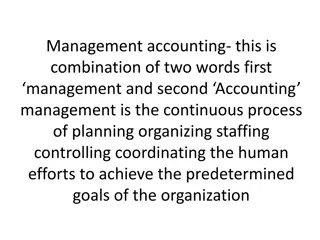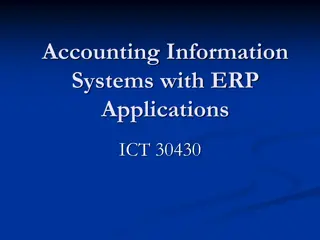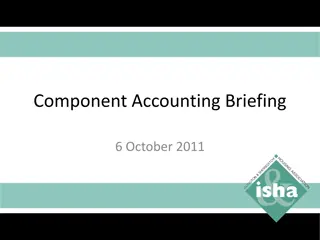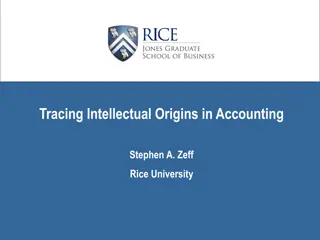Understanding Cost Accounting: Techniques and Processes
Cost accounting is a specialized branch of accounting that involves the accumulation, assignment, and control of costs. It encompasses techniques like ascertainment of costs, estimation of costs, and cost control to aid in decision-making. Cost accounting plays a crucial role in budgeting, standard costing, and analyzing variances for profitability. By providing systematic procedures for recording and reporting cost data, cost accounting helps in cost reduction without compromising quality.
Download Presentation

Please find below an Image/Link to download the presentation.
The content on the website is provided AS IS for your information and personal use only. It may not be sold, licensed, or shared on other websites without obtaining consent from the author. Download presentation by click this link. If you encounter any issues during the download, it is possible that the publisher has removed the file from their server.
E N D
Presentation Transcript
CLASS -1 2
COSTING In the Terminology of the ICMA London costing has been expressed as The techniques and processes of ascertaining cost . As a technique it implies a body of principles and rules applied for ascertaining cost. As a process it involves the procedure for ascertainment of cost. It is concerned with computation of cost and ascertainment of profits. 3
Costing Covers: Ascertainment of costs. Analysis of costs. Allocation of costs. Apportionment of costs. Absorption of cost. 4
It is a specialised branch of accounting that remains involved with accumulation , assignment and control of cost. CIMA London has defined it as The establishment of budgets , standard costs and actual costs of operations , processes , activities or products and the analysis of variances , profitability or the social use of funds . the classification , 5
Cost accounting provide a systematic set of procedures for recording measurements of cost of manufacturing goods and performing services. and reporting 1. Ascertainment of cost Cost ascertainment involves collection of cost data , their classification and condensation according their needs or functions and their appropriate allocation and absorption. 6
2. Estimation of cost It means pre determination of cost of units to be produced , jobs or orders to be executed and services to be rendered in future. It helps to establishment standard cost to give the scope of analysing variances and profitability. 3. Fixation of selling price The selling price is fixed by adding desired profit with actual cost or estimated cost . The quotation or tender price , value of different orders can be fixed with help. 7
4. Cost control Cost accounting techniques are applied to fix standards or budgeted cost. Comparison can be made with actual cost. Variances, wastages, losses or inefficiencies can be detected. 5. Cost reduction It provide techniques to reduce cost but to maintain or improve quality. It aims to reduce cost of goods and services , actual budgeting control and marginal costing. 8
6. Cost reporting It provides different pieces of information regarding goods produced and services rendered. The management requires such information to prepare cost statements and other statements as and when required. 7. Rendering assistance in decision making - cost accounting helps to determine cost volume profit relationship, operations to be shut down or making any replacement, etc. correct decision depend much upon cost accounting. 9
It is a branch of accounting related to the presentation of accounting information to the management in a manner to assist them in discharging their managerial function like planning , decision making and control. Management supply information about its past and present operations for deciding future trends and course of action. It contains techniques to solve problems , take right decisions, plan effectively and to exercise control. 10
The ICWAI opines that Management accounting is a system of collection and presentation of relevant economic information relating to an enterprise for planning , controlling and decision making. Budgetary control ,standard costing ,marginal costing , breakeven analysis, cost volume and profit analysis etc are some techniques used by cost accountant under management accounting. 11





